Lycopene is an antioxidant found originally in tomatoes that can improve cardiovascular health, prevent oxidative damage and oxidative stress, treat systemic inflammation, and has even been studied as a preventative agent against prostate cancer.
Lycopene can be taken in supplemental form to get a concentrated dose, with all of the antioxidant and anti-inflammatory benefits, and has been studied in a number of clinical trials for its potential for improving long-term health.
We’ve reviewed and ranked the ten most effective lycopene supplements on the market, so if you are looking to take advantage of the long term health benefits associated with this supplement, read on.
Research
Rankings
1. NOW Lycopene
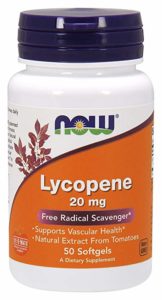
NOW Lycopene keeps it basic, but this formulation has a solid dosage of 20 mg of lycopene per capsule, which is delivered in rice bran oil and a gelatin capsule.
Those aside, there are zero additional ingredients, making this an excellent choice for lycopene.
2. Puritan’s Pride Lycopene
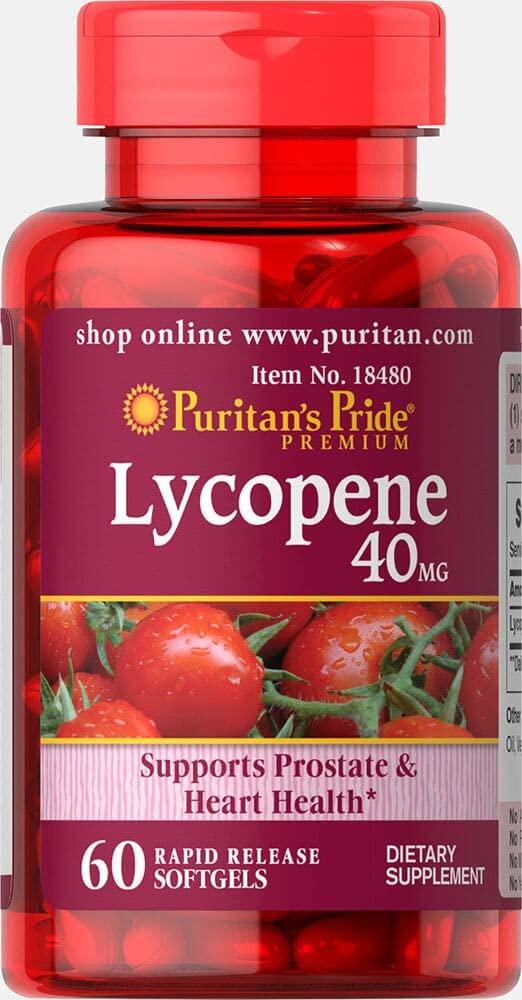
Puritan’s Pride Lycopene is popular and the dosage is high, at 40 mg per capsule.
The capsule design isn’t the cleanest, but as far as lycopene supplements that are both high dosage and delivered dissolved in a lipid solution, it’s your best bet by a long ways.
3. Life Extension Mega Lycopene
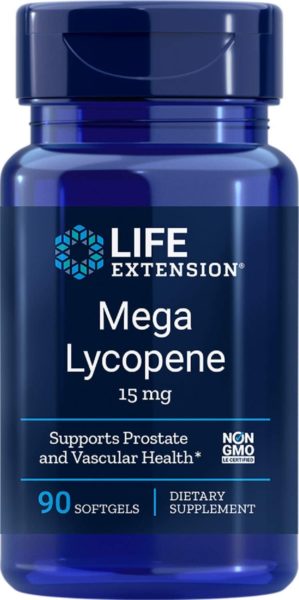
Life Extension Mega Lycopene offers a middle of the road dosage of 15 mg of lycopene in a soy-free formulation that uses rice bran oil and sunflower lecithin as the primary solvents for lycopene.
It’s a pretty good and fairly pure choice if you don’t need a super-high dosage of lycopene.
4. Healthy Origins Natural Lyc-O-Mato
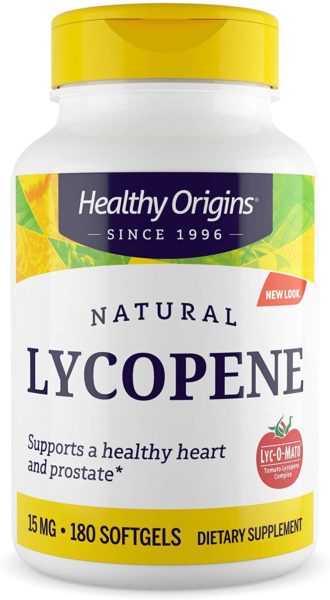
Healthy Origins Natural Lyc-O-Mato doesn’t deliver the highest lycopene dosage, at only 15 mg per capsule, but it does provide lycopene alongside plenty of the other biologically active compounds you’ll find in tomatoes, like vitamin A, vitamin E, and a number of phytonutrients that support the function of lycopene.
5. We Like Vitamins Lycopene
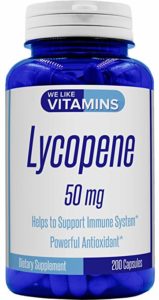
We Like Vitamins Lycopene is the way to go if you want a strong dose of lycopene. At 50 mg per capsule, it provides multiple times the dosage you’d get in many other lycopene supplements.
In addition, the only other ingredients in this supplement are gelatin and rice flour, making it a very simply designed supplement.
However, this lycopene supplement does have one disadvantage: the lycopene is not dissolved in an oil, so it will be tougher for your body to absorb if you don’t take it alongside food with some fat or oil in it.
6. KRK Supplements Lycopene-50
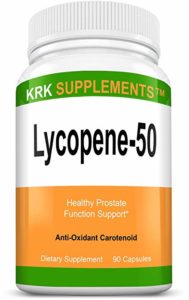
KRK Supplements Lycopene-50 also uses a high dose form of lycopene, and delivers 50 mg per capsule, but its ingredients list is a touch more bloated.
Additionally, it’s not quite as popular or well-known of a brand, which unfortunately leaves it lower in the rankings.
7. Swanson Lycopene
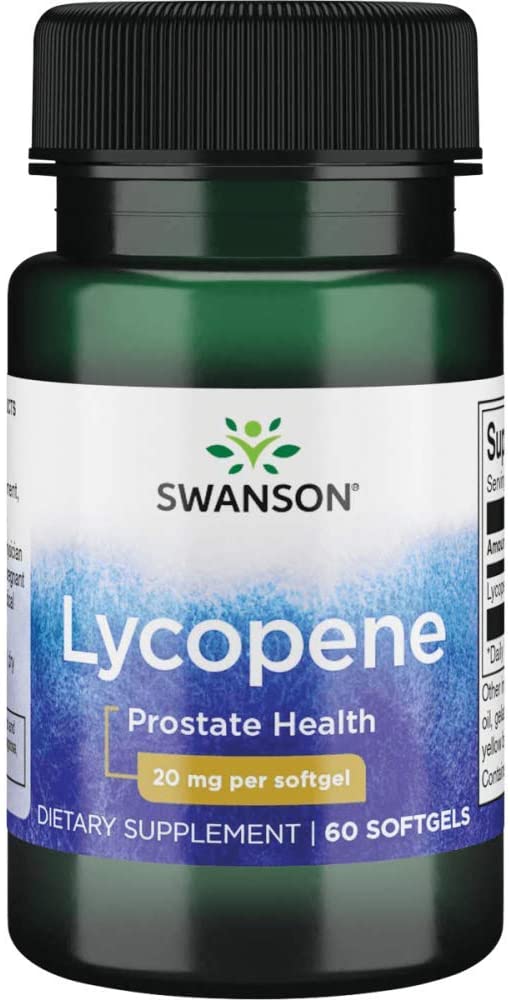
Swanson Lycopene delivers a solid 20 mg of lycopene per capsule, but unfortunately you’ll have to put up with several additives, like soybean oil and beeswax. For most people, there are better solutions for lycopene.
8. Dr. Mercola Saw Palmetto with Lycopene
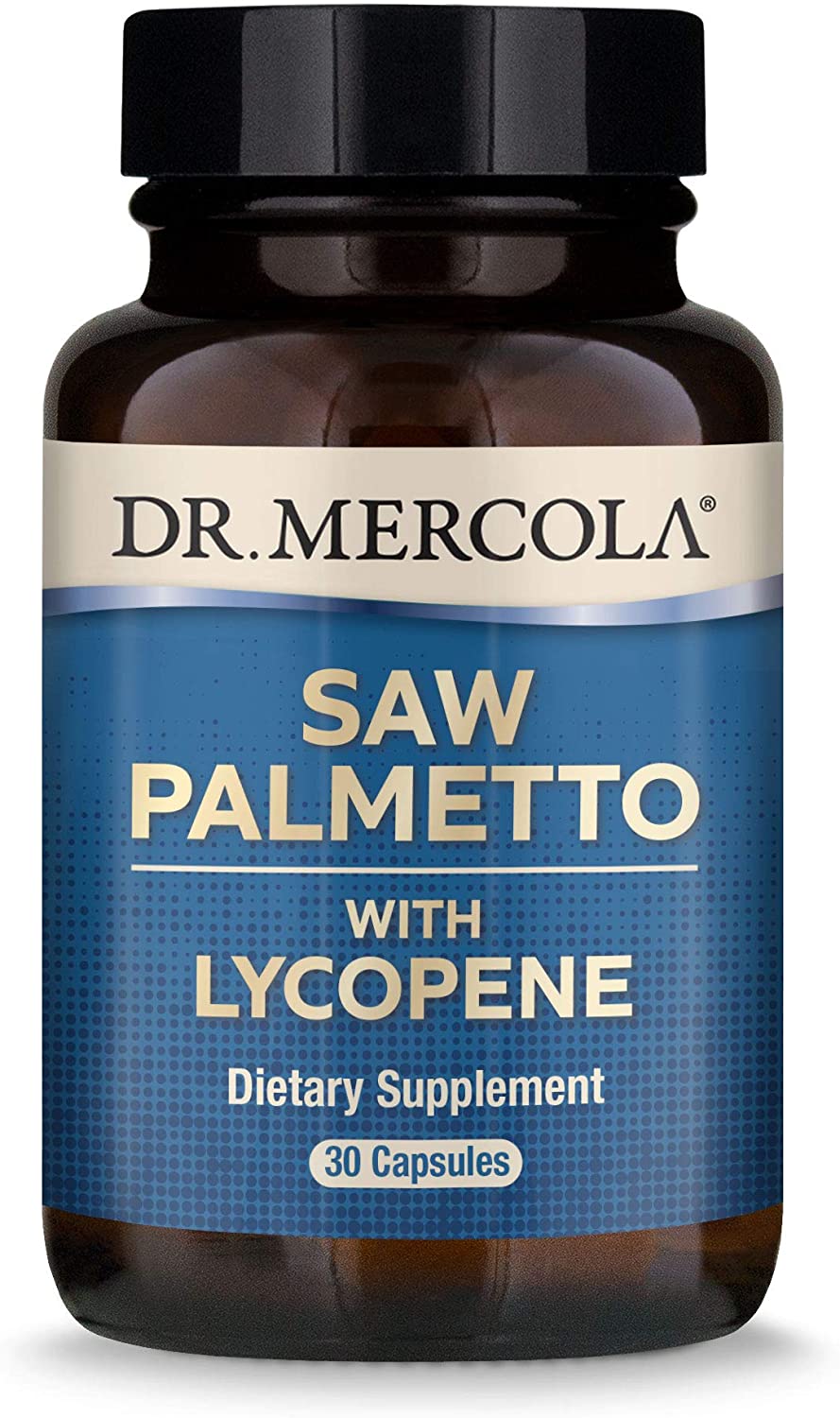
For people taking lycopene for sexual wellness, Dr. Mercola Saw Palmetto with Lycopene is a great option thanks to the synergistic interaction between lycopene and saw palmetto, another supplement that is very useful for men’s sexual wellness. While it’s a niche pick, it’s nevertheless an option to consider if you’re specifically looking to take lycopene for your sexual health.
9. NutriONN 100% Natural Tomato Lycopene
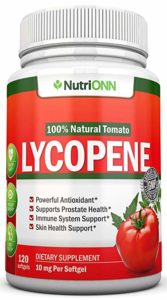
NutriONN 100% Natural Tomato Lycopene is low in dosage and not the best when it comes to supplement design either; though its users do rate it quite highly, its low dosage (10 mg per capsule) and slightly bloated ingredients list is bested by a number of other lycopene supplements on the market
10. 21st Century Maximum Strength Lycopene
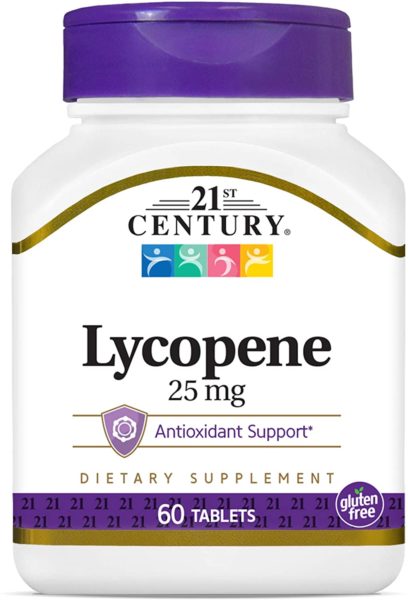
While 21st Century Maximum Strength Lycopene is a popular source of lycopene, its tablet-based formulation means that it carries a lot more additives than a capsule.
If you don’t mind tablet fillers, binders, and coloring agents, like silicon dioxide and artificial coloring agents, its dosage is solid, at 25 mg, but for purity, there are a lot better options out there.
Category winners
Best lycopene overall: NOW Lycopene
NOW Lycopene takes our top stop thanks to its solid dosage and super-pure formulation. It’s a reliable go-to for daily lycopene supplementation for any purpose.
Best lycopene for inflammation: Puritan’s Pride Lycopene
Want to harness the powerful anti-inflammatory properties of lycopene? Puritan’s Pride Lycopene is the way to go. Its market-leading dosage of 40 mg per capsule puts the full power of lycopene to work in cutting down on inflammation in your body.
Best lycopene for heart health: NOW Lycopene
NOW Lycopene is our choice if you’re in the market for a daily lycopene supplement to take for heart health. The dosage is solid, but not excessive, and the capsules are simplistic and free of extraneous ingredients, which is particularly desirable for something you might be taking for the long term.
Best lycopene for prostate health: Puritan’s Pride Lycopene
Puritan’s Pride Lycopene is high in dosage and is dissolved in a lipid solution, which further aids its bioavailability and helps give it the best shot at improving prostate health.
Best lycopene for skin: Puritan’s Pride Lycopene
Puritan’s Pride delivers a powerful 40 mg dose of lycopene, which helps ensure that this powerful antioxidant makes its way to your skin to fight oxidative damage and encourage collagen healing. For a quick and easy supplement for healthy skin, it’s an easy pick.
Best lycopene for eye health: Life Extension Mega Lycopene
Looking for a lycopene supplement to go along with an eye vitamin? Life Extension Mega Lycopene is our favorite, thanks to its middle-of-the-road dosage and very pure formulation. For eye health, it seems to be more important to maintain consistent intake of key nutrients over long periods of time, versus taking high doses, which tilts the scales towards Life Extension.
Who should buy lycopene?
Lycopene is generally considered safe for most individuals and is helpful in protecting against CVD, and certain cancers. While there are many other touted benefits, there is insufficient evidence to support most of the claims.
Pregnant women and children should avoid lycopene supplements as there is insufficient research regarding the safety in these populations. People who have recently undergone surgery or who are going too in the near future should also avoid lycopene as it may slow down bloodletting, causing excessive bleeding. It’s recommended to stay from lycopene for two weeks pre and post-operation.
Lycopene doesn’t currently interact with any medications, but you should still speak to your doctor before taking it if you are taking prescription medications – just to be safe.
How We Ranked
The first thing we analyzed, when ranking the best lycopene supplements, was the ingredient list. For our rankings, we preferred supplements that included lycopene on its own. Products like KRK and Nature’s Bounty with bloated ingredient lists were penalized and ranked lower, despite the higher dosage of lycopene per serving. On the contrary, products like Now made the top of the list for providing a supplement with almost nothing other than lycopene.
Next, we looked at the dosage. According to research, 15mg per day seems to be the lowest effective dosage. As such, we preferred products with more than that, like GNC. Products that had very high dosages (50mg) were penalized, as this made it difficult to tailor to the individual.
Since almost all lycopene supplements come in capsules, the capsule design was impotent to consider. While we did have a slight preference for cellulose-based capsules, if the design was clean, we did not penalize gelatin ones.
Lastly, we considered purity. Companies like Now that provided third-party testing information ranked the best as it showed the company’s commitment to purity. This is why they took our top spot.
Benefits
Lycopene intake has been linked to decreased risk of cardiovascular disease. Initial evidence for the health benefits of lycopene came from epidemiological studies which involved thousands of people who filled out food frequency questionnaires, who were then tracked over time.
Researchers noticed a pattern between high consumption of tomato-containing foods and a decreased risk of cardiovascular disease.
One such study, published in the Journal of Nutrition by researchers at at Brigham and Women’s Hospital in Boston, quantified this relationship among a group of nearly 40,000 women (1).
The researchers uncovered a trend towards lower rates of cardiovascular disease among the women who had the highest intake of tomato-based foods, particularly when they contained oil as well.
Lycopene is absorbed better when it’s dissolved in fat or oil. Like a few of its chemically-related compounds, like beta carotene (found in eye vitamins, general antioxidant supplements, among other sources), lycopene is fat-soluble.
That means that your body stores it and absorbs it better when you supply it alongside some fat. According to Dr. Edward Giovannucci, a nutritional epidemiology researcher at Harvard University’s School of Public Health, lycopene should be consumed alongside fats or oils if eaten in food (2).
By extension, a high-quality lycopene supplement will provide lycopene dissolved in some type of oil, like soybean oil or corn oil. This will ensure greater absorption.
The fat solubility of lycopene isn’t merely theoretical: a study published in 2005 by researchers in Australia demonstrated convincingly that lycopene in tomatoes consumed by itself is absorbed much less effectively than when it is accompanied by oil (3).
The antioxidative power of lycopene may prevent prostate cancer. Like many other antioxidants, like green tea and resveratrol, one of the areas of greatest interest in lycopene supplementation is in the possibility that it could reduce your risk of cancer.
Epidemiological evidence supports this link, at least with regards to prostate cancer. A study published in the Journal of the National Cancer Institute in 2002 examined the link between lycopene intake and prostate cancer incidence among a group of health care professionals who were tracked longitudinally for several years, and those who got prostate cancer were recorded (4).
The researchers found that people who had the greatest estimated intake of lycopene had a 23% lower risk of prostate cancer compared to those with the lowest intake.
Lycopene has been studied as a treatment for prostate cancer as well. Because of the emerging evidence on lycopene’s ability to prevent prostate cancer, some small pilot studies have even examined using it as an adjunctive treatment for prostate cancer.
One study published in 2001 used a 30 mg dose of lycopene or a placebo in a small group of men who had been recently diagnosed with prostate cancer (5).
Since the men were going to have their prostates removed surgically anyways, the researchers tested the effects of a three week lycopene supplementation routine on the growth of their prostate tumors.
Though the sample size was small, the researchers did find that the tumors in the men who had taken lycopene had grown less than the tumors in the men who took the placebo, providing tantalizing evidence that lycopene could even be used in addition to standard treatments for prostate cancer.
It should be emphasized, though, that this was a pilot study with a very small sample size and it’s not possible to draw any firm conclusions from these data.
Lycopene can reduce inflammation and improve cholesterol levels, especially in people who are overweight. Thanks to its anti-inflammatory properties, lycopene has also been subjected to studies on reducing inflammation.
One target condition for much of these experiments is obesity, as excess body fat is directly linked to chronic, systemic inflammation, which in turn is thought to cause many of the negative health effects related to obesity.
One study published in the Journal of Nutritional Biochemistry studied overweight individuals over the course of twelve weeks (6). Half the subjects were put on a low lycopene diet, while the other half were put on a high lycopene diet and also given a 10 mg lycopene supplement to take every day.
The researchers found that the high lycopene group decreased biomarkers of inflammation while also increasing their levels of HDL (“good”) cholesterol. This adds to the tally of chronic diseases that lycopene may help improve or prevent.
Side effects
Pretty much all lycopene supplements contain no more lycopene than you’d get with several hearty servings of any tomato-containing food, so the odds of any adverse effects are extremely low.
A study published in 2006 in the journal Regulatory Toxicology and Pharmacology reviewed the scientific literature and established 75 mg per day as a well-established observed safe level―even at intakes this high, no negative effects are observed (7).
Even beyond this intake level, the only reason the threshold isn’t higher is because of a lack of evidence.
Recommended dosage
Based on extrapolations from the epidemiological literature, to match the lycopene intake among the people with the lowest risk for cardiovascular disease and prostate cancer, you should strive for at least 10 mg of lycopene per day, and a higher intake of 15-30 mg per day is probably better.
To date, clinical research has focused on doses of 30 mg per day, split into two capsules (one taken in the morning and one taken in the evening).
This likely helps keep blood levels of lycopene high throughout the day and night. As mentioned earlier, lycopene will probably be absorbed most effectively if it’s taken in a supplement that delivers the lycopene dissolved in an oil.
For treating systemic inflammation related to being overweight, you may need a higher dosage if your dietary intake of lycopene also does not go up.
The clinical research on using lycopene for systemic inflammation in people who are overweight or obese uses a high lycopene diet in conjunction with supplementation, so you may need to up the standard dosage.
FAQ
What is the best natural source of lycopene? Lycopene has been widely recognized as a powerful antioxidant and anti-inflammatory, making it widely used and widely studied to reduce risk factors for heart disease, cancer, and other chronic diseases linked to inflammation and oxidative damage.
It’s best-known as a constituent of tomatoes, and indeed, tomatoes are by far the greatest source of lycopene, but it’s also found in watermelon, cabbage, grapefruit, and papaya.
Can lycopene help with weight loss? There is no solid proof that lycopene supplements are effective for weight loss. Still, many weight loss products contain small amounts of the nutrient. Naturally occurring lycopene in foods like tomatoes and cooked red peppers may be more effective for weight loss because they are part of a balanced and healthy diet.
Does lycopene cause acne? It’s suggested that lycopene can help treat acne because of its role in nature. The potent antioxidant is present in fruits and vegetables to prevent harm from the sun. While it’s not suggested that it causes acne, the evidence behind it helping to treat acne is also not sufficient.
How does lycopene help sunburns? There have been some studies that have shown lycopene can reduce the severity of sunburns as a preventative measure, but there is no conclusive evidence. Lycopene is a strong antioxidant that attacks free radicals in the body, helping to promote skin and cell health, which is where the link comes from.
Can lycopene help my eyesight? Yes. It is possible that lycopene can help reduce the formation of cataracts and reduce macular degeneration, which are the leading causes of blindness in adults (8).
More studies are required to quantify these claims. Similarly to preventing sunburns, lycopene’s antioxidant properties, and how they attack free radicals are the primary evidence linking it to potentially improving one’s eyesight.
Does lycopene lower blood pressure? There have been studies that suggest lycopene has helped lower blood pressure in individuals who suffer from the ailment. However, if the individual had pre-hypertension, it has not been effective.
Lycopene is known to have adverse interactions with blood pressure medication, so please consult your doctor if you are looking to take lycopene to treat your high blood pressure, and you are already on medication.
How much lycopene should I take? The dosage of lycopene supplements will vary by manufacturer and by each person. Typically, lycopene supplements come in a soft gel or capsule form, and the dosage can range from 10mg per day to 30mg per day. Many studies have used 7mg per day to 75mg per day doses in their research.
When should I take lycopene? Always read and follow the label of any supplement you are taking. Typically, lycopene is taken twice daily with meals. Dosage times can vary among manufacturers, so ensure you are following the directions of the product you are using.
Can I take lycopene if I am pregnant or breastfeeding? Lycopene supplements may be unsafe for pregnant or breastfeeding women. A small study has shown there to be adverse effects in using lycopene during pregnancy, causing preterm labor or low birth weight, but another small study showed no evidence of this (2).
Unfortunately, there is not enough known about the interactions between these supplements and pregnancy, so please contact your physician if you want to start a supplement like this during your pregnancy.
Which is the best lycopene supplement? While everyone has different preferences for their favorite supplements, some of the most popular brands of lycopene include Puritans Pride Lycopene, NOW Supplements Lycopene, 21st Century Lycopene, Ahana Nutrition Lycopene, and KRK Supplements Lycopene.
Who should avoid lycopene? Lycopene supplements are not ideal for anyone with a tomato allergy. Lycopene can slow down blood clotting and can cause bleeding in people who have recently had surgery, so they should avoid taking a supplement. Pregnant women or women who are breastfeeding should consult their doctor before taking a lycopene supplement.
Can I take lycopene with a multivitamin? Many multivitamins contain lycopene already, so double-check to make sure you are doubling your dose of lycopene. If you want to take both a multivitamin and Lycopene, consult your doctor or pharmacist before combining supplements.
Can I take lycopene with an antioxidant? Lycopene is a powerful antioxidant with many health benefits. If you want to combine lycopene with another antioxidant or supplement, please contact your doctor and discuss it with them before starting on any supplement combination.
It is possible that lycopene can negatively interact with other supplements. Some other supplements may decrease the body’s absorption of lycopene as well.
Is it possible to take too much lycopene? The appropriate dosage of lycopene will vary from person to person. There are many factors that contribute to determining which is the right dose, including age and overall health. However, you can take too much lycopene, but it’s hard to decide on what too much may be for you. If you start having adverse effects, please contact poison control or a medical professional to determine a solution.
Does lycopene prevent prostate cancer? There have been conflicting results in the studies linking lycopene to cancer prevention. Some studies have shown that lycopene has reduced the growth of cancer and lowered the risk of cancer. In contrast, others have demonstrated that lycopene has no bearing on cancer prevention.
Is there an impact on male fertility by taking lycopene? Studies have shown that consistently taking lycopene can have a positive effect on sperm quality. There was one study done in India in 2000 that involved a sample of 30 men who participated by taking 2000 micrograms of lycopene twice daily. 66% of them showed a significant improvement in sperm concentration over the three month period.
More studies with larger sample sizes would be required to suggest this evidence as being substantial.
How do I know if I am allergic to lycopene? While lycopene is non-toxic and naturally occurring, there are some individuals who are allergic. Reported ailments related to lycopene allergy include rashes, stomach pain or cramps, gas, diarrhea, nausea, and loss of appetite.
If you have a sensitivity to tomatoes, grapefruit, red peppers, plums, or other fruits and vegetables with a red pigment, consult with your doctor before taking lycopene supplements.
Are lycopene’s benefits all true? From lowering blood pressure to preventing many types of cancer, it is suggested that lycopene is a fantastic antioxidant. Many studies have been done on the effects of lycopene in the body, and the results are somewhat inconclusive. Some studies show very positive results, and some show no impact from the supplement.
More research is required to substantiate the claims surrounding lycopene and its actual impact on our health. Regardless of the back and forth nature of lycopene studies, researchers are optimistic that lycopene has many real benefits.
Does lycopene help with joint pain? Like many of the other claims that lycopene is associated with, there is evidence to suggest that lycopene both helps and has no significant impact on joint pain. Lycopene has also been linked to helping prevent rheumatoid arthritis and other serious joint issues. Still, there is not enough evidence to have a concrete conclusion.
Does lycopene help with asthma? Research suggests that lycopene may help protect the lungs from inflammation before the onset of allergic airways in mice, but the study has not been replicated with humans. Clinical studies suggest that a diet rich in antioxidants can help reduce the risk of developing asthma, but it is unclear what role lycopene plays as an individual nutrient.
How do I know if lycopene is right for me? Determining if a supplement is right for you on your own can be a challenge. Make an appointment with your doctor to discuss lycopene, the scientific benefits, and a proper dosage based on your age, health, and pre-existing conditions. This can help determine if it is right for you.
All in all, lycopene can be an excellent supplement for someone who doesn’t eat a lot of the fruits and vegetables containing it naturally, but still wants to gain the benefits from it.
Is lycopene safe to take with other medications? Lycopene supplements have been known to interact with blood thinners and blood pressure medications. If you are on a medication that increases the risk of bleeding, like ibuprofen, naproxen, warfarin, antiplatelet drugs, or heparin, adding lycopene can further increase the risk of bleeding. Please consult your doctor before starting a new lycopene supplement if you take any medications.
Is lycopene effective at strengthening my immune system? Lycopene is a powerful antioxidant, but it is not solely responsible for immune health. Your immune system benefits more from a variety of vitamins, minerals, and antioxidants from a healthy and balanced diet. Additional supplements are excellent if you specifically lack a nutrient, but your doctor should determine that and discuss your options with you.
Can lycopene reduce the risk of stroke? According to Harvard Medical School, lycopene found naturally occurring in tomatoes was linked to reducing the risk of stroke because of the anti-inflammatory properties. The same cannot be said for a lycopene supplement since further research and studies are necessary to determine this.
How long should I take lycopene for? Some physicians suggest taking lycopene for up to six months, but studies indicate that it can be taken up to a year with no adverse effects. Consult your doctor to monitor and help manage how long you should be taking a lycopene supplement.
Are lycopene supplements better than lycopene from tomatoes? While lycopene supplements may contain more lycopene per serving, many researchers speculate that lycopene from tomatoes is actually more beneficial and effective. While there are many possibilities, it is believed that there is more of a synergistic effect with the tomato’s other beneficial nutrients, fiber, and vitamins.
There are tens of thousands of phytochemicals found in tomatoes, all of which play a role protecting against disease, alongside lycopene. In general, it is almost always better to consume the food version of a supplement, rather than the synthetic version in a capsule or tablet.
Related Articles
Recap
Lycopene has strong antioxidant and anti-inflammatory properties, and these properties appear to be linked to decreases in risk for cardiovascular disease and prostate cancer. Lycopene, being a fat-soluble vitamin, is best absorbed when dissolved in oil.
If your supplement does not deliver it in oil, consider taking it alongside some olive oil or fish oil to boost absorption. Shoot for at least 10 mg per day, and 30 mg per day would be better. Most clinical studies split this dose up into two equal portions taken in the morning and the evening.
Lycopene is a particularly good supplement choice for men, because they are obviously at risk for prostate cancer, and in addition, men have a higher rate of cardiovascular disease than women.
Taking a lycopene supplement is one way you might be able to mitigate these risks and improve your long-term health.
For BodyNutrition’s #1 recommended lycopene supplement, click here.